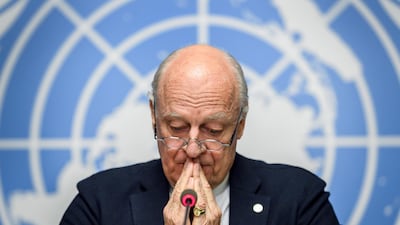For four years, UN special envoy Staffan de Mistura, who steps down next month, worked tirelessly to bring the Syrian war to an end – a thankless task in the face of world powers working in their own interests to carve out power for themselves. Ultimately, his best efforts were not enough.
When Mr De Mistura took on the role, he inherited a conflict as complex as it was brutal. Myriad militia groups were in their ascendancy and posed a genuine threat to the regime of Bashar Al Assad. ISIS, too, was occupying vast swathes of Syrian land.
The Syria of today is incomparable. The Assad regime has violently reclaimed much of the country, with the help of Russia and Iran. Opposition groups have either reformed or been decimated – as has ISIS – and Mr Al Assad looks more entrenched than ever. In the meantime, more than half a million people have died, millions have been displaced, chemical weapons have been deployed repeatedly and the UN has grown ever feebler.
This transformation might have occurred on Mr De Mistura's watch but he is not solely to blame. Rather, he inherited a poisoned chalice, a job dubbed "mission impossible" by his predecessor Kofi Annan, who only lasted nine months in the role. With the regime disinterested in peace, the meddling of various global powers and the UN Security Council bedevilled by disagreement, the mountain was simply too high for one man to climb.
Mr De Mistura came to the post on the back of a four decade-long UN career encompassing Ethiopia, Bosnia, Iraq and Afghanistan. Those who know him praise his vast reserves of determination and patience. And yet it seems in Syria, he met his match. His first initiative, a six-week ceasefire in Aleppo, collapsed immediately.
But perhaps his greatest failing was attending the Astana talks between Iran, Russia and Turkey, which nullified his own Geneva process and gave the alternative talks the legitimacy needed to eclipse the UN’s role. The recent ceasefire in Idlib was agreed by Ankara and Moscow with no UN involvement. His assertion that the innumerable combatants would eventually tire of fighting and negotiate demonstrated a naivete uncharacteristic for such an experienced envoy. And his fears of alienating the regime prevented him from reining in Mr Al Assad’s worst excesses.
He leaves a mixed legacy and a Syria which sees Mr Al Assad retaining the presidency with even greater powers than before, backed by his sponsors. Mr De Mistura used his final months to push for a new Syrian constitution involving all parties but on Wednesday, Syrian foreign minister Walid Al Moallem warned him against interfering in "sovereign" matters.
And so he resigns his post having failed to bring the parties to the table – and the war to an end. That leaves one troubling question: with even those charged with the task of looking after their best interests abandoning Syrians in their hour of need and admitting defeat, what hope can they have for the future?

